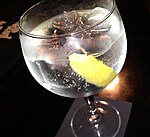| Cocktail | |
|---|---|
| Type | Cocktail |
| Base spirit | |
| Commonly used ingredients |
|
| Preparation | Mix thoroughly and drink quickly. |
Yorsh (Russian: Ёрш, lit. ruffe, a little spiky fish), also known as mora grogg,[citation needed] is a Russian mixed drink consisting of beer thoroughly mixed with an ample quantity of vodka.[2][3] It is traditionally drunk in a social setting, typically with a toast followed by downing a full glass of it at one go.[citation needed] It is commonly consumed in Russia.[citation needed] The term is colloquially used similarly to the "jungle juice" in English[4] to designate an alcoholic mix of incompatible ingredients.[5]
Vodka is a neutral spirit which does not greatly alter the flavor of the beer, but does greatly increase its alcohol content.
Probably the first evidence of presence of such a mix in Russian drinking culture is the Tale of Woe and Misfortune, an anonymous 17th-century poem. The early version of yorsh described there included a precursor to vodka, bread wine, however.[citation needed]
The total amount of alcohol in the traditional version is not very high (but the kick from the mix is unordinary): a pseudonymous author of the book on the home-made libations suggests mixing 50 grams of vodka with 200 grams of beer. For a heavier "Chpock" (Russian: Чпок, an imitation of the popping sound), a more potent mix of just 50 grams of beer to 100 grams of vodka is suggested. The name of the latter drink is related to the way of mixing: after pouring both liquids into a glass, it is supposed to be covered with a palm of the hand, turned over and hit against the knee, producing the desired sound. For a full effect consumption is supposed to be completed quickly, while the bubbles and the foam are still present.[1]
See also[edit]
References[edit]
- ^ a b АлкоФан 2022.
- ^ "Коктейль Ерш: состав, рецепты и последствия употребления: Ерш — напиток который не следует готовить и пить". Алколайф: рецепты алкогольных напитков в домашних условиях (in Russian). 18 January 2022. Retrieved 14 October 2022.
- ^ "Vodka: A Taste of Russia - New York Times". archive.nytimes.com. Retrieved 17 October 2022.
- ^ Чичерова, Е.А. (2018). "Гастрономический код культуры в сленге военнослужащих". Universum:Филология и искусствоведение (in Russian). 54 (8).
- ^ Фетисова, Н. А. (2017). "Способы создания юмористического эффекта в англоязычном кино и стратегии перевода". Язык, литература и культура как грани межкультурного общения (in Russian). TERIS, Градиент. pp. 345–357.
Sources[edit]
- АлкоФан (2022). ""Ерш" и "Чпок" (Водка с пивом)". Алкогольные коктейли в домашних условиях. 65 рецептов (in Russian). ЛитРес. Retrieved 15 January 2024.
External links[edit]
